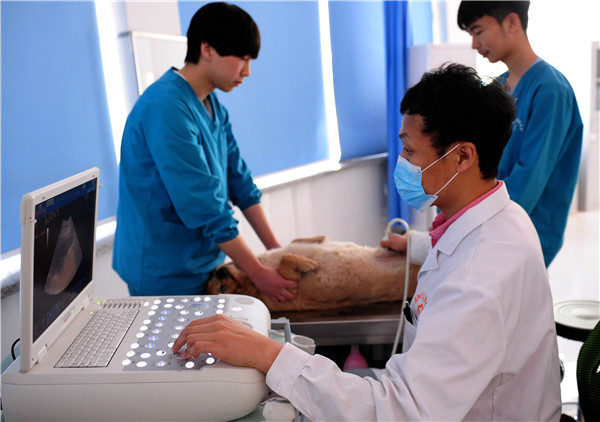
Veterinarians perform an ultrasound test on a dog in May at a pet hospital in Shenyang, Liaoning province. (Provided to CHINA DAILY)
More students in China are choosing veterinary medicine as a career thanks to rising salaries and the growing demand for animal care, according to industry sources.
Up to 10,000 students graduate with majors in the field every year in China, but the country is still short more than 1 million vets, said Xiong Fuqiang, deputy Party chief of Nanjing Agricultural University's veterinary medicine school.
"Few students, especially female students, wanted to become vets in the past due to a heavy workload, low salary and bad working environment. But we have had good applicants in the past two years, and more than 60 percent of them are female."
He said that the average starting salary for veterinary graduates is 4,000 yuan ($606) a month, and in three years their earnings can surpass 10,000 yuan, higher than the salaries of many other majors.
Zhao Yanbin, vice-president of the school, said more Chinese families are willing to spend money on their pets, including expensive medical treatment.
"Animals share more than 90 percent of the same diseases with people. They also have diabetes, heart disease and liver failure," he said. But Zhao said medical expenses for pets-which are subject to less regulation-"can be double those for people."
An MRI for pets can cost 2,500 to 3,000 yuan, while dialysis costs about 10,000 yuan.
Xiong said Nanjing, with 8 million people, had almost no pet hospitals before 2006, but now it has more than 100. He estimated the pet care market in China will keep increasing by 30 to 35 percent yearly.
"A small pet hospital, which has fewer than 10 employees, can make more than 10 million yuan a year," he said. "A pet hospital affiliated with our university receives at least 40 pets a day."
Zhang Fuhong, 39, a veterinarian who graduated from Shandong Agricultural University, started his professional career in 2012 and now owns a pet hospital in Liaocheng.
"It's not a very respectable job in many people's eyes," Zhang said. "But it's very easy to find a job if you study to be a veterinarian."
Xiong said some veterinary medicine graduates don't end up providing direct medical services, instead opting for jobs as civil servants or veterinary medicine researchers, aggravating the country's shortage of veterinarians.
"Compared with doctors for people, veterinarians need to treat different kinds of animals and a wide variety of diseases," Xiong said. "To some extent, they must have more professional knowledge and need more practice."
He said that veterinary medicine schools in the country should be equipped with more laboratory equipment and students should have a chance to gain more clinical experience to help ease the shortage.
The demand for practitioners shows no signs of slowing.
The number of pets in China has increased by 12 percent every year for 10 years, Beijing Youth Daily reported in March. China has become the world's third-largest pet market, just behind the United States and Japan, with the sales of supplies for dogs and cats reaching 172 billion yuan in 2016.


















































